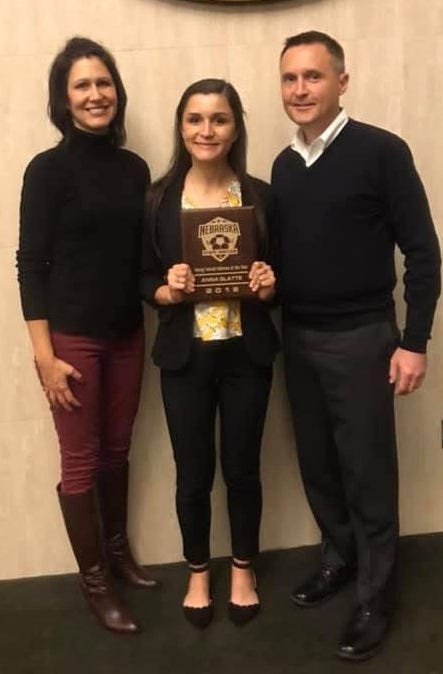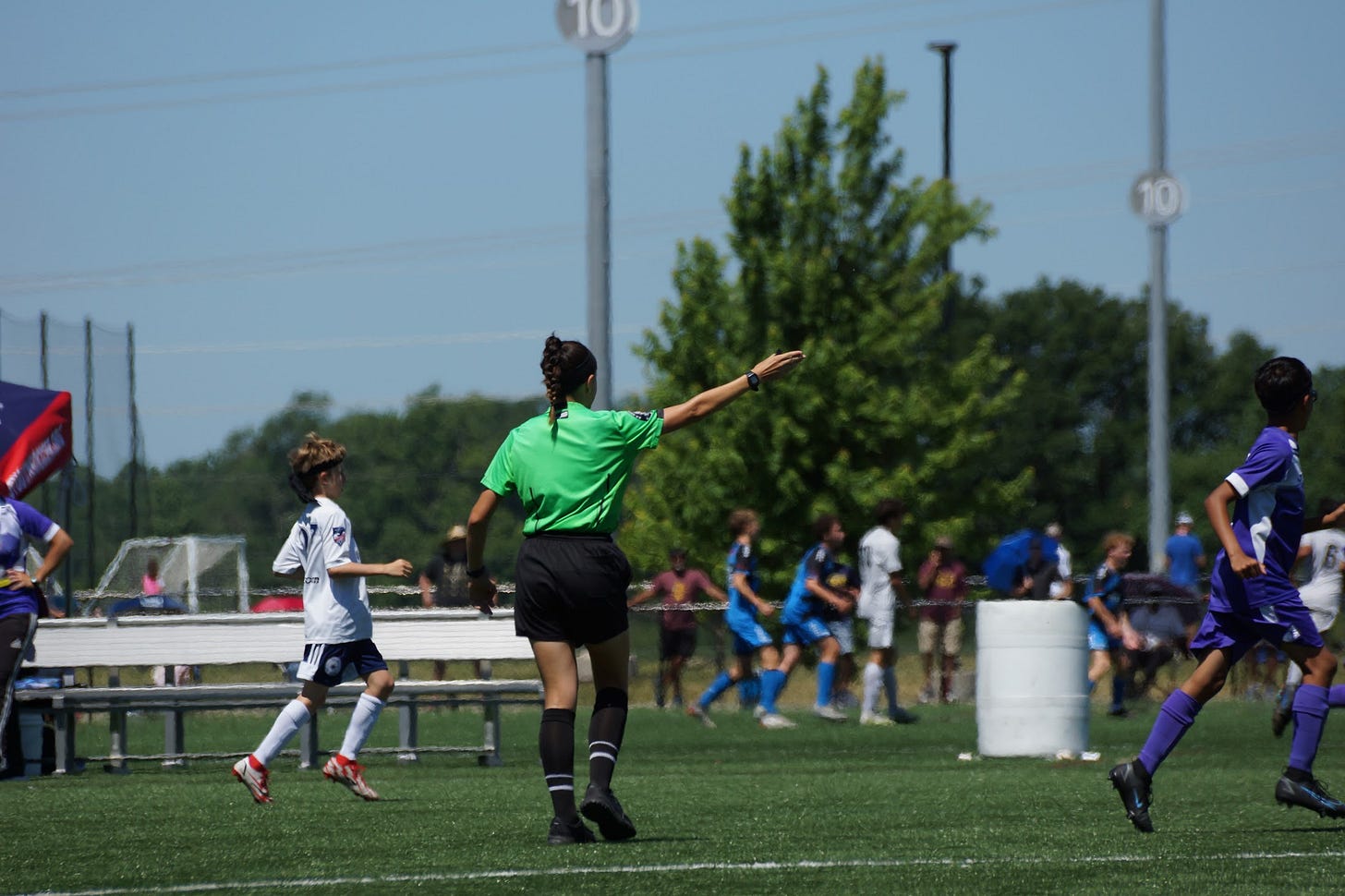Soccer is often a child’s first experience with organized sport, as recreational leagues are available to kids as young as four. So it should be no surprise that kids as young as 13 can start officiating the same game.
That was Anna Glatte’s path.
“Growing up, I played recreational soccer. To be quite honest with you, I wasn't the best soccer player. But when my dad started officiating soccer in his thirties, he encouraged me to join him.”
Anna got certified as a soccer official at 13 and was thrown into an 8U game right away.
“I worked with Gary Morrison, who was in charge of referee development at the time. I was in the center position, but he was running alongside me, training me throughout the game. After that initial training, I took on more games and just learned as I worked.”
Even though Anna had played soccer as a youth, she never really understood the intricacies of the rules, different formations, and how they could be relevant to a soccer game. Officiating changed that.
“I fell in love with the game through officiating. And I learned everything I know about soccer through officiating.”
Anna honed her craft by working recreational games in the beginning.
“Refereeing the younger kids was nice because you didn't have to run a whole lot, but you got experience making calls and dealing with players and coaches, and spectators.”
Anna learned early that the adults watching and coaching would not always have nice things to say about her performance.
“When I started officiating, Nebraska State Soccer hadn't yet implemented the Referee Abuse Policies, which state there's absolutely zero tolerance for any yelling at the referee. So I didn't have that protection when I started, and there were instances of adults yelling at me. I learned to stand my ground. It helped me learn to deal with it.”
Dealing with irate coaches and fans is not easy, but Anna says it’s been helpful to network with other officials to brainstorm how to deal with it.
“I deal with the challenging comments from coaches, players, and parents by talking with other officials. I ask my crewmates their opinion about the noise–Was it me or something else? Is this game going south because of my officiating, or is it because of everyone else's perception of what's going on? Distinguishing those two things was most important for my growth.”
Anna has learned to use the tools available in her game to deal with these difficult situations.
“Sometimes I do feel hurt by the things that coaches and players and spectators say, because sometimes it gets really personal. But we do have tools to address this, like the yellow and red cards, and I’ve learned to use these a lot more. It helps me communicate that I’m not going to take the abuse. When I first started officiating, I would not caution people for being disrespectful to me, but now I feel like I have empowered myself to do that.”
The Nebraska Referee Development Program (NRDP) provides additional training so soccer referees can be ready for any game.
“The NRDP Board puts on a yearly seminar for all soccer referees. It’s great for networking and getting to know more advanced officials. And they also provide mentoring opportunities from ‘referee coaches’, who observe newer officials and provide feedback. The culture in Nebraska is that if you can help someone with their game, you're expected to help them as much as you can. That’s been very beneficial for me, because I know that if I'm working with an advanced referee that they're not just going to ignore my performance on the game. They will give me feedback.”
A soccer official trained under the NRDP will be ready to jump into high school matches when they register with the NSAA.
“The club side of things merges with the high school side of things. The same people who are going to be advanced referees in high school are also advanced referees on the club side as well.”
Anna started officiating high school soccer games when she was still in high school. And it didn’t take long for Anna to reach the pinnacle of Nebraska high school soccer.
“I worked my first Nebraska State Soccer Championship when I was 18. I was an assistant referee (i.e., the sideline referee), and had never used a headset before–that was an interesting experience.”
Since that first state tournament, Anna has learned how to be calm under pressure.
“We’re taught that, yeah, this is a huge game, but you have to make sure that you're calling it just as you would any other game, so that you're not letting the pressure of it keep you from correct decision making. I’ve learned how to work under that pressure.”
Anna says that one of the hardest aspects of officiating is staying focused.
“You're going to get a lot of opinions from the outside about your calls. So the most difficult part of it is not letting that affect your decision-making. What has helped me is understanding that each player, spectator, and coach kind of is coming at it from a certain perspective. I’ve learned that if I’m overly critical of myself, it's going to hurt my performance. So I know that a coach is going to talk to me during the game to get something to go his or her way. And players and spectators are going to do that as well. It comes down to learning to find balance and call an objective game.”
In Nebraska, roughly 15% of all NSAA-registered soccer officials are female. Anna says she wishes more females were involved.
“I would like to know how we can get females to stay in the game. There are a lot of teenage female referees, but once they get past college age, they seem to drop out.”
Anna thinks mentoring might be a way to change this trend.
“A couple of years ago, at a regional competition, one of the 16-year-old male players said to me after a call, This is why females shouldn't referee. Thankfully, my mentor during that tournament was a female, and we talked about it, and I felt understood. Mentoring is so important, and so I think if we want to have more female officials, we should have more female official mentors as well.”


Despite the challenges, Anna has found her place in a game that’s been a part of the majority of her life.
“I enjoy having the opportunity to always improve something about my game. I learn something new every time I officiate. I love it when I have an experience that I've never had before –it’s another situation that I learn how to deal with. And because I love to run, staying fit has been really great, too!”










Very cool to read Anna’s officiating journey. Good find, MK!